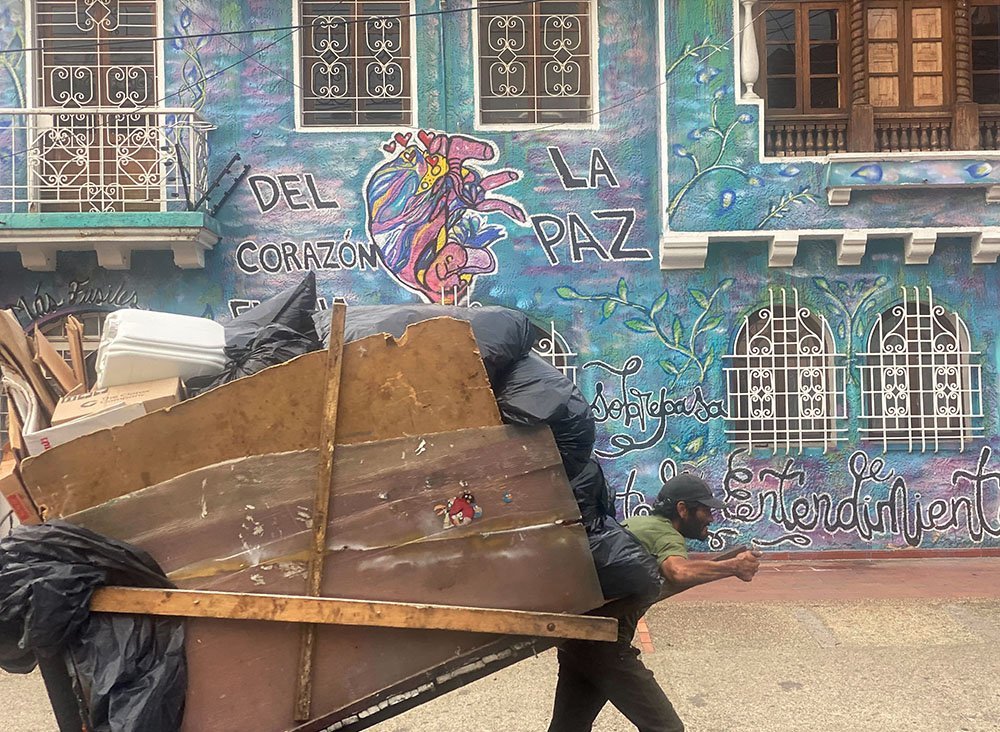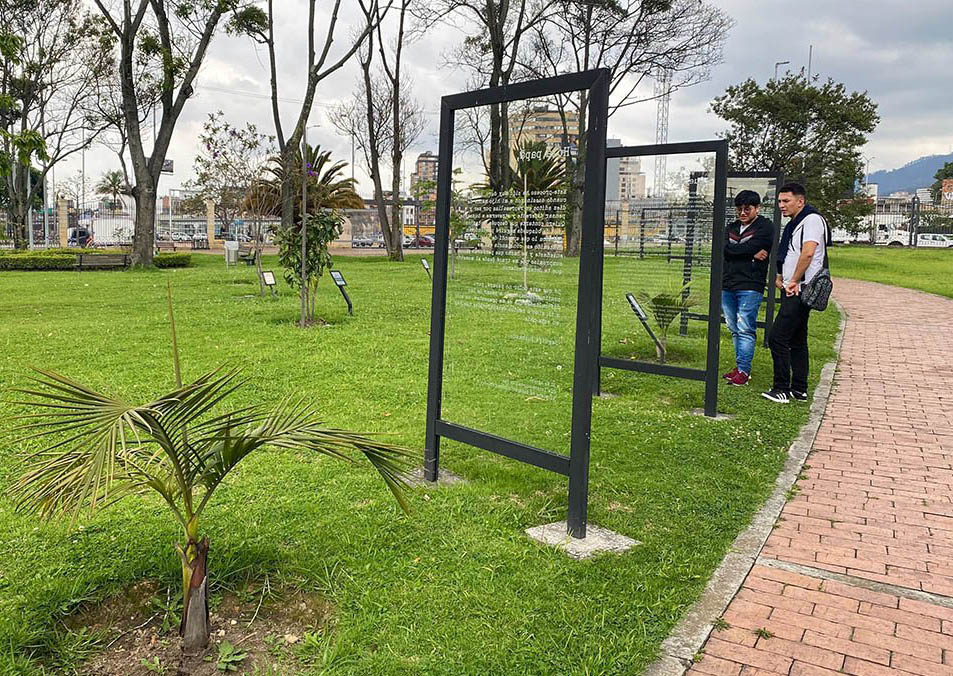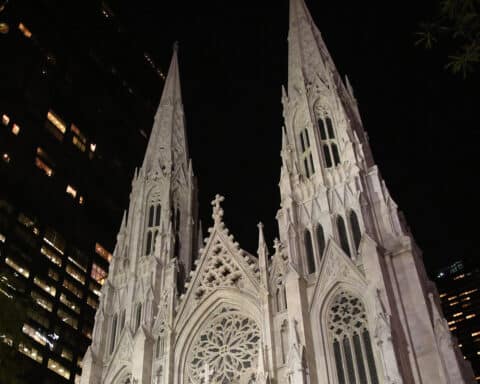BOGOTÁ, Colombia (OSV News) — Sister Diana Herrera Castañeda still remembers those tense weekends from her childhood in Bogotá.
“It was the time of Pablo Escobar,” Sister Herrera said. “I was about 9 years old. On Fridays, Saturdays and Sundays, starting at three or four in the afternoon, one could hear bombs everywhere. And you were at home — with your parents, with uncles — always in fear.”
The concern was even greater if a family member was away from home.
Years later, as an adult and a sister of the Congregation of St. Catherine of Siena, she realized that what others suffered at that time had been much worse than the anguish that permeated the city.
“It’s very different when you hear the story of the people from (rural areas), where they were displaced,” she said. “I had the opportunity, seven years ago, to work with two associations of peasant women. … They told how their mothers would hide them at night to prevent the illegal armed group from (taking) and raping them and (from) taking their sons away as recruits.”
Now, as an academic, Sister Herrera studies the role of religious sisters in Colombia’s more than 50-year conflict.
“One begins to find that female religious life has played a very important role in accompaniment, and above all, accompaniment in the most violent places, where people expressed resistance,” said Sister Herrera in an interview with Global Sisters Report in Bogotá. “It is a story that I feel has remained silent and hidden.”
Nuns contribute to peace
Perhaps religious sisters have not been present at the dialogue tables between opposition groups, like members of the church hierarchy have in Colombia, something that resulted in the signing of peace agreements in 2016. But with their ministries and presence in towns that suffered near and far from the capital, nuns have contributed to the peace process in an intimate way, Sister Herrera said.
On many occasions, they have taught others “to see this moment of pain, of anguish, in a different way, to redefine it through productive projects,” she said.

In some places, women religious have helped recover the historical memory of what happened in areas that suffered disproportionately from the war and, in some cases, where the conflict still lingers.
In places such as Chocó, Antioquia, and Granada, sisters, through sewing and baking projects, have given victims the opportunity to channel their pain, or physically participate in an activity that helps them meditate, then talk and heal from their losses, from the abuse. Sometimes, for the sisters, that takes the form of sitting down to participate in a craft and reaching out to people who haven’t been able to talk about their traumas before, Sister Herrera said.
“You sit down to sew with (the person). And it is very beautiful because then sewing is not simply an activity. … It’s taking the portraits of missing persons and crocheting them, taking the name of a missing person and decorating it with flowers or symbols,” she added.
Stories of pain
And in Colombia, stories of pain and violence, and people who need healing, abound.
In some places, like the Center for Memory, Peace, and Reconciliation in Bogotá, you can hear stories of the war, such as that of Gloria Inés Alvarado. Her eyes still sparkle when she sees the photo of her beloved son, Luis Alejandro Concha Alvarado. He was an extraordinary violinist, Alvarado said, focused, at age 23, on his philosophy studies at the Free University of Bogotá. He was days away from leaving for Paris, where he had received a scholarship to continue his studies.
“I don’t think my son was perfect, but he was extraordinary as a human being, as a person, as a family member, as a companion,” Alvarado said, contemplating his image Nov. 22 in the middle of an exhibit that included photos of her family. “But the news that broke worldwide on April 16, 2006, alleged that my son was a terrorist.”
For his mother, Luis not only became another victim of the armed conflict that day, but also a victim of the state’s lies.
Government officials suggested to members of the press that Luis and three other students, who died with him during an explosion in the building where his family lived, were assembling explosives to help the Revolutionary Armed Forces of Colombia, known as FARC, in conflict with the government at that time.
Despite the insinuations, officials never presented evidence nor investigated the incident, she said. The only thing they did was sow doubt and pain for the family, as well as for thousands of Colombians who still seek answers about the deaths and disappearances that transpired during the conflict.
Women witnessing violence
Illustrating the pain that many like Alvarado carry with them day after day, the final report of the Truth Commission (published in 2022) revealed what “women had to witness,” Sister Herrera said. “How they entered their homes, killed their husbands, took their sons and raped their daughters. … And not only the illegal groups. Unfortunately, the army also took part in all this.”
What is not disclosed, Sister Herrera said, is the dedication of many religious sisters during those times, some of whom have been very visible, such as the case of Sister Maritze Trigos Torres, a Dominican Sister of the Presentation.
Sister Trigos, a human rights defender for more than 30 years in different places of conflict in Colombia, speaks in a 2019 YouTube interview about her “option for the one who needs the most, for the one whose human rights have been violated.”
Sister Trigos “helped teach people how to exercise their right to petition, taught people how justice works in Colombia, and (how to) speak up,” Sister Herrera said. “She was part of a search unit for a group of missing people and went to help find the bodies of the people who’d been killed.”
Sister Herrera said there also are cases of women religious like Sister Yolanda Cerón, of the Company of Mary, shot dead by paramilitaries in September 2001 in front of a church in the urban area of Tumaco, Nariño, situated in southwestern Colombia.
Like Sister Trigos, Sister Cerón saw the need to join the resistance and helped those around her, many of them Afro-Colombian and Indigenous, to defend themselves, Sister Herrera said.
“Illegal gangs are emerging, as well as drug trafficking groups … and so they had to denounce the Colombian state, and that was when the whole mess began because the state itself began to go against them,” she said.
‘Accompaniment in silence’
During the toughest days of the coronavirus pandemic, when many activities were carried out virtually, Sister Herrera had the opportunity to listen to reconciliation talks from a region accompanied by religious sisters during the conflict, she said. She heard stories of what she calls “accompaniment in silence” from sisters who visited families, who were with them in mourning the death or disappearance of a loved one, or how they helped people escape clandestinely.
“There are religious communities who hid people in their homes, in their convents, in their communities, so that they could escape” and survive, she said.
She also heard about a community of women religious who dedicated themselves to single mothers-to-be so that they would not have abortions, as some did not want to give birth amid the conflict.
“They took them in and said, ‘No. Come. We’ll give you support, but don’t abort,'” and they accompanied them, even when the time to give the child up for adoption came.
Colombia continues to have problems despite having signed peace agreements. The war, in some places, for the poor and distant and rural towns and cities, is still going on, Sister Herrera said. So the sisters’ work also continues.
“That is where religious life begins to make more sense, from its social side, to say, ‘Our task is to listen, to help people find their way, not so much to heal, but to help them see that there are other opportunities, for life,'” and proving that life, no matter what happens, can go on, she said.
Rhina Guidos is the Latin America regional correspondent for Global Sisters Report.





